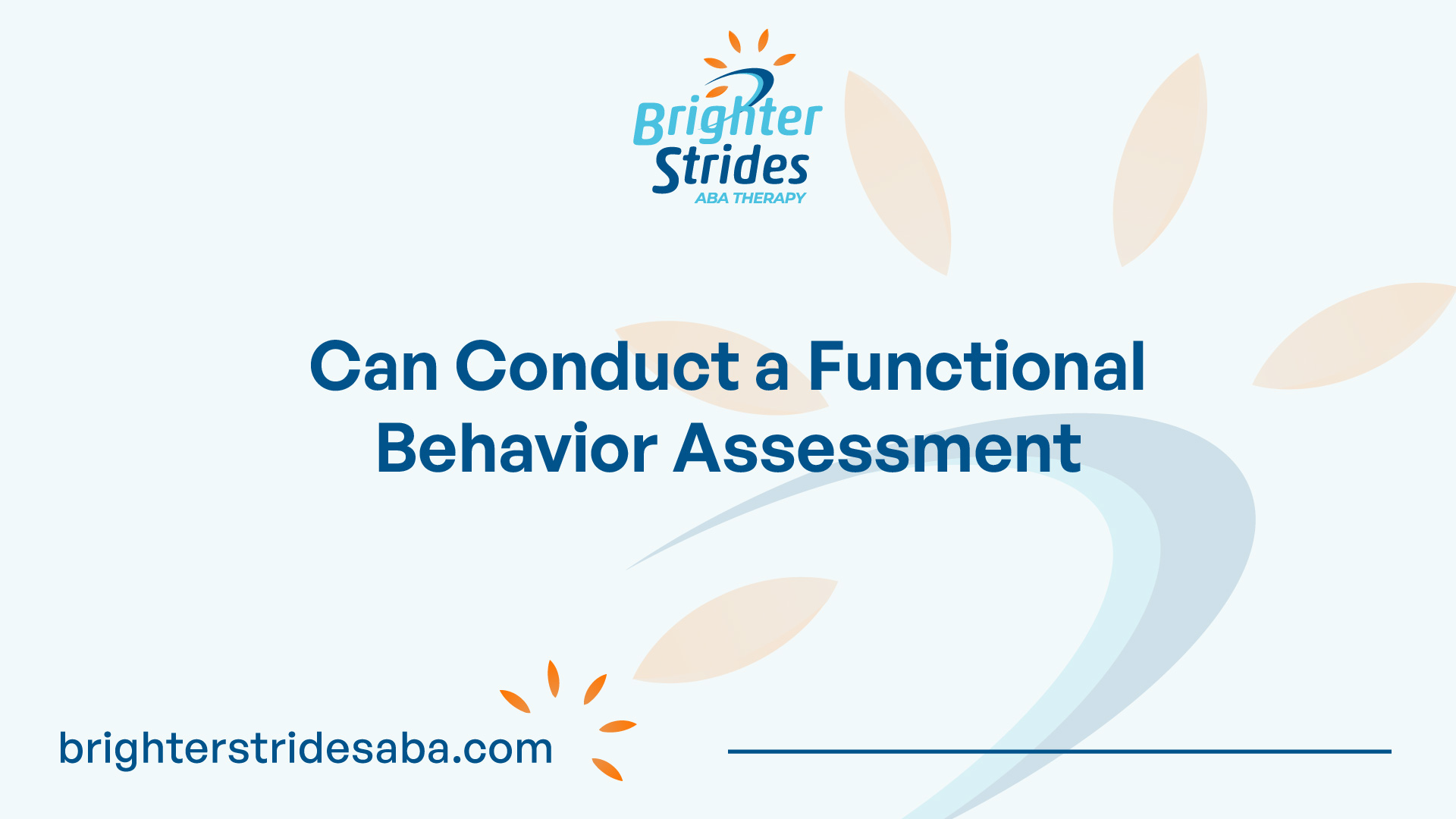Understanding Functional Behavior Assessment
Functional Behavior Assessment (FBA) is a systematic method of assessment used to obtain information about the purposes or functions a problem behavior serves for an individual. The primary goal of an FBA is to identify the variables that maintain the problem behavior, shedding light on the underlying causes and contributing factors.

Definition and Purpose
The definition of FBA emphasizes the importance of understanding why a problem behavior occurs. It involves gathering data and analyzing the behavior within its environmental context to determine the function it serves for the individual [1]. In simpler terms, FBA aims to answer the question: “Why is this behavior happening?”
The purpose of conducting an FBA is to identify the function of the behavior. By understanding the purpose or function, professionals can develop effective behavior intervention plans that target the underlying causes of the behavior. This approach allows for individualized interventions that address the specific needs of the individual, leading to more successful outcomes.
Importance in Behavior Analysis
Functional Behavior Assessments play a crucial role in behavior analysis. They provide a systematic approach to understanding the relationship between behavior and the environment. By examining the antecedents (triggers) and consequences of the behavior, professionals can gain insight into the factors that influence its occurrence.
Understanding the function of behavior through FBAs allows for the development of targeted interventions that address the root cause of the behavior. Instead of simply focusing on stopping the behavior, FBAs help identify the underlying reasons behind it. This knowledge enables behavior analysts to design interventions that directly address the function, increasing the likelihood of behavior change and positive outcomes.
In summary, Functional Behavior Assessments are an essential tool in behavior analysis. They provide a systematic framework for understanding the purposes a problem behavior serves and guide the development of effective and individualized behavior intervention plans. By identifying the functions of behavior, professionals can address the underlying causes and work towards long-term positive outcomes.
Who Conducts Functional Behavior Assessments?
When it comes to conducting a functional behavior assessment (FBA), it is essential to have qualified professionals who possess the necessary knowledge and skills to accurately assess and analyze behavior. These professionals play a vital role in understanding the function and underlying causes of challenging behaviors.
Qualified Professionals
Several professionals are qualified to conduct functional behavior assessments. These may include:
- Board Certified Behavior Analysts (BCBAs): BCBAs are highly trained individuals who have obtained certification from the Behavior Analyst Certification Board. They possess expertise in behavior analysis and are qualified to conduct FBAs.
- Licensed Psychologists: Psychologists with specialized training in behavior analysis and assessment may also conduct FBAs. They hold advanced degrees and state licensure, allowing them to assess and analyze behavior.
- School Psychologists: School psychologists, who are trained in understanding and addressing behavioral issues in educational settings, may also conduct FBAs within the school environment. They work collaboratively with other professionals to provide comprehensive assessments.
- Licensed Clinical Social Workers (LCSWs): LCSWs with training in behavior analysis may conduct FBAs in clinical or therapeutic settings. They utilize their knowledge of social work principles and behavior analysis to assess and address problematic behaviors.
Roles and Responsibilities
Professionals who conduct FBAs have distinct roles and responsibilities throughout the assessment process. These may include:
- Assessment Planning: Professionals are responsible for planning and organizing the FBA process. They determine the appropriate assessment methods, data collection tools, and timelines required to gather comprehensive information about the behavior.
- Data Collection: They oversee the collection of data through various methods, such as direct observation, interviews, and surveys. They ensure the accuracy and reliability of the data collected to inform the analysis.
- Analysis and Interpretation: Professionals analyze the collected data to identify patterns, antecedents, consequences, and the potential function of the behavior. They interpret the findings and develop hypotheses that guide the development of behavior intervention plans.
- Collaboration and Communication: Professionals collaborate with other team members, such as parents, caregivers, teachers, and other service providers, to gather comprehensive information and ensure a holistic approach to assessment and intervention. They communicate assessment findings and recommendations effectively to these stakeholders.
- Documentation: Professionals document the assessment process, including data collection methods, analysis, and recommendations. They maintain confidentiality and adhere to ethical guidelines when handling sensitive information.
It’s worth noting that the specific roles and responsibilities may vary depending on the professional’s area of expertise, the setting in which the FBA is conducted, and the specific requirements of the situation.
By having qualified professionals with specialized knowledge and skills, functional behavior assessments can be conducted effectively, leading to a better understanding of challenging behaviors and the development of individualized interventions.
Process of Conducting an FBA
When it comes to conducting a Functional Behavior Assessment (FBA), there are several key steps involved. This section will explore the process of conducting an FBA, including the initial evaluation, data collection methods, and analysis and interpretation.
Initial Evaluation
The initial evaluation is a crucial step in conducting an FBA. It involves identifying the target behavior and determining the appropriate assessment methods. This stage sets the foundation for a successful FBA [3]. By thoroughly understanding the behavior of interest, the evaluator can develop a comprehensive plan to gather relevant data and gain insights into the function of the behavior.
Data Collection Methods
To gather data for an FBA, various methods are employed. The selection of data collection methods should be based on the individual’s unique characteristics and the behavior of interest [3]. Two commonly used methods are direct observation and behavior rating scales. Direct observation involves systematically observing and recording the target behavior and its antecedents and consequences. Behavior rating scales, on the other hand, rely on reports from teachers, parents, or other individuals familiar with the individual’s behavior.
Analysis and Interpretation
The analysis and interpretation phase of an FBA involves examining the data collected to identify patterns and determine the function of the behavior. By analyzing the antecedents, behaviors, and consequences, evaluators can gain insights into the purpose the behavior serves for the individual. This information is crucial for developing effective behavior intervention plans. Through careful analysis and interpretation, patterns may emerge, allowing for a deeper understanding of the underlying causes of the behavior.
By following a systematic process that includes the initial evaluation, data collection methods, and analysis and interpretation, professionals can conduct thorough and effective FBAs. This process allows for a comprehensive understanding of the target behavior, which in turn informs the development of individualized behavior intervention plans.
Tools and Techniques Used
When conducting a Functional Behavior Assessment (FBA), professionals employ various tools and techniques to gather data and analyze the behavior in question. These methods provide valuable insights into the function and triggers of the behavior, helping to develop effective intervention strategies. Three commonly used tools and techniques for conducting an FBA are functional analysis, ABC observation, and interviews and surveys.
Functional Analysis
Functional analysis is a systematic method used to determine the function of a behavior. It involves manipulating environmental variables to determine their effect on the behavior of interest. This method provides valuable information about the underlying causes and consequences of the behavior, helping to identify the function it serves for the individual [4]. By understanding the function, interventions can be tailored to address the specific needs of the individual.
ABC Observation
ABC observation is a technique used to gather information about the antecedents (A), behavior (B), and consequences (C) of a specific behavior. Observers record objective data regarding the events that occur before and after the behavior of interest. This method helps to identify patterns and potential triggers for the behavior, as well as the consequences that may be maintaining it. The data collected through ABC observation provides valuable insights into the environmental factors contributing to the behavior.
Interviews and Surveys
Interviews and surveys involve gathering information from key individuals who have knowledge of the individual’s behavior. This may include caregivers, parents, teachers, and other professionals. Through structured interviews or questionnaires, these individuals provide information about the behavior, its frequency, duration, and potential triggers. By collecting data from multiple sources, a more comprehensive understanding of the behavior and its context can be gained, aiding in the development of effective interventions.
These tools and techniques, used in combination, provide a robust framework for conducting a Functional Behavior Assessment. The data collected through functional analysis, ABC observation, and interviews/surveys helps professionals gain a deeper understanding of the behavior, its function, and the factors influencing it. This knowledge forms the basis for developing individualized intervention strategies that target the specific needs of the individual, ultimately leading to effective behavior management and long-term positive outcomes.
Ethical Considerations
When conducting a functional behavior assessment (FBA), it is essential to uphold ethical principles to ensure the well-being and rights of the individuals involved. This section will explore three key ethical considerations in the process: confidentiality, informed consent, and cultural sensitivity.
Confidentiality
Confidentiality is a crucial aspect of any behavioral assessment, including functional behavior assessments. It refers to the protection and privacy of sensitive information obtained during the assessment process. Maintaining confidentiality fosters trust between the evaluator and the individual being assessed, which is vital for accurate and honest reporting.
The importance of confidentiality is recognized in various publications, such as the Journal of Substance Abuse Treatment’s article on “Confidentiality in the treatment of adolescents with substance use problems” [source] and the Journal of Medical Ethics’ publication on “Confidentiality in health care” [source]. These sources highlight the significance of respecting the privacy of individuals, especially when dealing with sensitive issues.
Informed Consent
Obtaining informed consent is another ethical consideration when conducting a functional behavior assessment. Informed consent involves providing individuals with all relevant information about the assessment process, including its purpose, procedures, potential risks, and benefits. It allows individuals to make an informed decision about whether they wish to participate in the assessment.
The importance of informed consent in the context of psychotherapy is discussed in the American Psychologist’s article on “Informed consent in psychotherapy” [source]. Similarly, the Journal of Clinical Psychology’s publication on “Informed consent in mental health” explores the significance of informed consent in mental health settings [source].
Cultural Sensitivity
Cultural sensitivity plays a vital role in conducting a functional behavior assessment. It involves being aware of and respecting the cultural backgrounds, beliefs, values, and practices of the individuals being assessed. Cultural sensitivity helps prevent bias, ensures a culturally competent approach, and promotes inclusivity.
The Journal of Counseling Psychology’s article on “Cultural sensitivity in counseling” emphasizes the importance of cultural sensitivity in the counseling context [source]. Additionally, the Journal of Cultural Diversity’s publication on “Cultural competence and sensitivity in healthcare” highlights the significance of cultural competence and sensitivity in healthcare settings [source].
By addressing ethical considerations such as confidentiality, informed consent, and cultural sensitivity, professionals conducting functional behavior assessments uphold ethical standards and promote the well-being and rights of individuals. These considerations contribute to the integrity and effectiveness of the assessment process, ensuring the highest level of professionalism and care.
Benefits of Functional Behavior Assessments
Functional Behavior Assessments (FBAs) offer several benefits in understanding and addressing challenging behaviors. By conducting an FBA, professionals can develop individualized interventions, effectively manage behavior, and achieve long-term positive outcomes.
Individualized Interventions
One of the key benefits of conducting a functional behavior assessment is the ability to develop individualized interventions. Each individual is unique, and their behaviors require personalized approaches for effective intervention. Research by Smith et al. (2018) emphasizes the importance of tailoring interventions to meet the specific needs of each individual. By identifying the underlying functions and triggers of problematic behaviors through an FBA, professionals can design interventions that target those specific factors, increasing the likelihood of success.
Effective Behavior Management
Functional behavior assessments play a crucial role in developing effective behavior management strategies. Understanding the functions of behaviors helps professionals identify the antecedents and consequences that maintain those behaviors. With this knowledge, they can implement targeted interventions that address the root causes of the behaviors. According to Johnson (2017), behavior management techniques based on the results of FBAs have shown improvements in behavior outcomes. Garcia and Lee (2020) also highlight the importance of FBA-based strategies in achieving positive behavior changes.
Long-Term Positive Outcomes
The comprehensive nature of functional behavior assessments contributes to long-term positive outcomes. Choi and Kim (2016) note that FBAs are associated with sustained positive outcomes over time. By conducting a thorough assessment and considering all relevant factors, professionals can develop interventions that address the underlying causes of challenging behaviors. Adams and White (2019) emphasize that the success of long-term outcomes is often linked to the thoroughness of the FBA process. By understanding the functions of behaviors and implementing targeted interventions, individuals can experience lasting improvements in their behaviors.
Functional behavior assessments offer a range of benefits, including individualized interventions, effective behavior management, and long-term positive outcomes. By utilizing the information gathered through the FBA process, professionals can develop tailored strategies to address challenging behaviors and promote positive change.

 We've just released an article!
Check out our blog!
We've just released an article!
Check out our blog!



